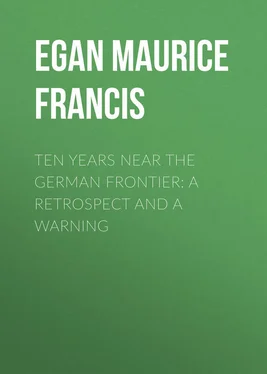Maurice Egan - Ten Years Near the German Frontier - A Retrospect and a Warning
Здесь есть возможность читать онлайн «Maurice Egan - Ten Years Near the German Frontier - A Retrospect and a Warning» — ознакомительный отрывок электронной книги совершенно бесплатно, а после прочтения отрывка купить полную версию. В некоторых случаях можно слушать аудио, скачать через торрент в формате fb2 и присутствует краткое содержание. Жанр: foreign_antique, foreign_prose, на английском языке. Описание произведения, (предисловие) а так же отзывы посетителей доступны на портале библиотеки ЛибКат.
- Название:Ten Years Near the German Frontier: A Retrospect and a Warning
- Автор:
- Жанр:
- Год:неизвестен
- ISBN:нет данных
- Рейтинг книги:5 / 5. Голосов: 1
-
Избранное:Добавить в избранное
- Отзывы:
-
Ваша оценка:
- 100
- 1
- 2
- 3
- 4
- 5
Ten Years Near the German Frontier: A Retrospect and a Warning: краткое содержание, описание и аннотация
Предлагаем к чтению аннотацию, описание, краткое содержание или предисловие (зависит от того, что написал сам автор книги «Ten Years Near the German Frontier: A Retrospect and a Warning»). Если вы не нашли необходимую информацию о книге — напишите в комментариях, мы постараемся отыскать её.
Ten Years Near the German Frontier: A Retrospect and a Warning — читать онлайн ознакомительный отрывок
Ниже представлен текст книги, разбитый по страницам. Система сохранения места последней прочитанной страницы, позволяет с удобством читать онлайн бесплатно книгу «Ten Years Near the German Frontier: A Retrospect and a Warning», без необходимости каждый раз заново искать на чём Вы остановились. Поставьте закладку, и сможете в любой момент перейти на страницу, на которой закончили чтение.
Интервал:
Закладка:
'But does he want war?'
'He is not bloodthirsty; he knows what war means, but he will want what his clique wants.'
These two diplomatists are both alive – one in exile – but I shall not mention their names. My colleagues were sometimes very frank. It would not be fair to tell secrets which would embarrass them – for a harmless phrase over a glass of Tokai is a different thing read over a glass of cold water! And, in the old days, before 1914, good dinners and good wines were very useful in diplomatic 'conversations.' Things began to change somewhat when after-dinner bridge came in. But, dinner or no dinner, bridge or no bridge, the diplomatic view was always serious.
In Denmark the thoughtful citizen often said, 'We are doomed; Germany can absorb us.' Count Holstein-Ledreborg once said, 'But Providence may save us yet.'
'By a miracle.'
It seemed absurd in 1908 that any great power should be allowed to think of conquering a smaller nation, simply because it was small. 'You don't reckon with public opinion – in the United States, for instance, – or the view of the Hague Conference,' I said.
'Public opinion in your country or anywhere else will count little against Krupp and his cannon. Public opinion will not save Denmark, for even Russia might have reason to look the other way. That would depend on England.'
It seemed impossible, for, like most Americans, I was almost an idealist. The world was being made a vestibule of heaven, and the pessimist was anathema! Was not science doing wonderful things? It had made life longer; it had put luxuries in the hands of the poor. The bad old days, when Madame du Barry could blind the eyes of Louis XV. to the horrors of the partition of Poland, and when the proud Maria Theresa could, in the same cause, subordinate her private conscience to the temptations of national expediency, were over. No man could be enslaved since Lincoln had lived! The Hague Conference would save Poland in due time, the democratic majority in Great Britain and Ireland was undoing the wrongs of centuries by granting Home Rule for Ireland, and, as for the Little Nations, public opinion would take care of them!
'What beautiful language you use, Mr. Minister,' said Count Holstein-Ledreborg; 'but you Americans live in a world of your own. Nobody knows what the military party in Germany will do. Go to Germany yourself. It is no longer the Germany of Canon Schmid, of Auerbach, of Heyse, of the Lorelei and the simple musical concert and the happy family life. Why, as many cannons as candles are hung on the Christmas trees!'
I repeated this speech to one of the most kindly of my colleagues, Count Henckel-Donnersmarck, who was really a sane human creature, too bored with artificiality to wear his honours with comfort.
'Oh, for your dress coat,' he would say. 'Look at my gold lace; I am loaded down like a camel. The old Germany, cher collègue , it is gone. I long for it; I am not of blood and iron; the old Germany, you will not find it, though you search even Bavaria and Silesia. And I believe, with the great Frederick, that your great country and mine may possess the future, if we are friends; therefore,' he smiled, 'I will not deceive you. The Germany of the American imagination, our old Germany, is gone.' He hated court ceremonies, whereas I rather like them; they were beautiful and stately symbols, sanctified by tradition. He ought to have danced at the court balls, but he never would. He was lazy. He was grateful to my wife, because she ordered me to dance the cotillions with Countess Henckel, who must dance with somebody who 'ranked,' or sit for five or six hours on a crimson bench.
The Danes had no belief that we could or would help them in a conflict for salvation, but they liked us. In 1909, when Dr. Cook suddenly came, they declared that they would take 'the word of an American gentleman' for his story of the North Pole. Sweden accepted him at once, England was divided – King Edward against Cook; Queen Alexandra for him! When Admiral Peary made his claim, the Queen of England said, – 'Thank heaven! it is American against American, and not Englishman against American.'
We were all glad of that; and I was very grateful to the Danes for showing respect for the honour of an American, in whom none of us had any reason to disbelieve. There was no warning from the scientists in the United States. The German savants accepted Dr. Cook at once. In fact, until Admiral Peary sent his message, there seemed to be no doubt as to Cook's claims, except on the part of the Royal British Geographical Society. I joined the Danish Royal Geographical Society at his reception; it was not my duty to cast aspersions on the honour of an American, of whom I only knew that he had written The Voyage of the Belgic , had been the associate of Admiral Peary, and was a member of very good clubs. Even if I had been scientific enough to have doubts, I should have been polite to him all the same.
As it was, Denmark was delighted to welcome Cook because he was an American; he had apparently accomplished a great thing, and besides, he directed attention from politics at a tremendous public crisis. The great question for the Danish Government was as usual: Shall we defend ourselves? Shall we build ships and keep a large army and erect fortresses, or simply say 'Kismet' when Germany comes? The Conservatives were for defence; the Radicals and Socialists against it. Mr. J. C. Christensen, one of the most powerful of Danish politicians, of the Moderate School, holding the balance of power, was in a tight place. Alberti, the clever Radical, had been supported by Christensen, who had been innocently involved in his fall. Alberti languished in jail, and Christensen was being horribly assailed when Dr. Cook came and Denmark forgot Christensen and went wild with delight!
In 1907-8, Denmark trembled for fear that she would lose her freedom. When would the Germans attack? The disorder in Slesvig was perennial. A bill for a reasonable defence had been proposed to the Danish Parliament. King Frederick had had great difficulty in forming a ministry. Count Morgen Friis, capable, distinguished, experienced, but with some of the indolence of the old grand seigneur, had refused. Richelieu could not see his way clear; nobody wanted the responsibility. The Socialists and the Radicals, practical, if you like, did not believe in building forts in the hope of saving the national honour.
King Frederick VIII. was at his wit's end for a premier, for, as I have said, even Count Morgen Friis, a man of undoubted ability and great influence, failed him. King Frederick, because of his desire to stand well with his people, was never popular. His glove was too velvety, and he treated his political enemies as well as he did his friends. Count Friis was known to lean towards England, and he was very popular; he would have stood for a strong defence.
Admiral de Richelieu was a man of great influence, a devoted Slesviger, and the greatest 'industrial,' with the exception of State-Councillor Andersen, in Denmark; he was not keen for the premiership, and his friends did not care that he should compromise their business interests; for, in Denmark, business and politics do not mix well.
Finally, King Frederick called on Count Holstein-Ledreborg, without doubt, with perhaps the exception of – but I must not mention living men – the cleverest man in Denmark. Count Holstein-Ledreborg was a recluse; he had been practically exiled by the scornful attitude taken by the aristocracy on account of his Radicalism, but had returned to his Renascence castle near the old dwelling-place of Beowulf. Count Holstein-Ledreborg was the last resource, he had been out of politics for many years. Although he was a pessimist, he was a furious patriot. He had a great respect for the abilities of the Radicals, like Edward Brandès, but very little for those – 'if they existed,' he said – of his own class in the aristocracy. He was one of the few Catholics among the aristocracy, and he had a burning grievance against the existing order of churchly things. The State church in Denmark is, like that of Sweden and Norway, Lutheran. Until 1848, except in one or two commercial towns where there was a constant influx of merchants, no Catholic church was permitted. The chapel of Count Holstein in his castle of Ledreborg, was still Lutheran. He was not permitted to have Mass said in it, as it was a church of the commune. This made the Lord of Ledreborg furious. There must be Lutheran worship in his own chapel, or no worship; this was the law!
Читать дальшеИнтервал:
Закладка:
Похожие книги на «Ten Years Near the German Frontier: A Retrospect and a Warning»
Представляем Вашему вниманию похожие книги на «Ten Years Near the German Frontier: A Retrospect and a Warning» списком для выбора. Мы отобрали схожую по названию и смыслу литературу в надежде предоставить читателям больше вариантов отыскать новые, интересные, ещё непрочитанные произведения.
Обсуждение, отзывы о книге «Ten Years Near the German Frontier: A Retrospect and a Warning» и просто собственные мнения читателей. Оставьте ваши комментарии, напишите, что Вы думаете о произведении, его смысле или главных героях. Укажите что конкретно понравилось, а что нет, и почему Вы так считаете.












